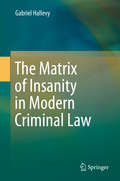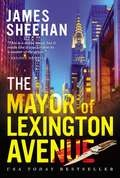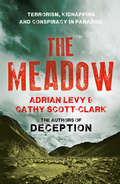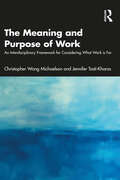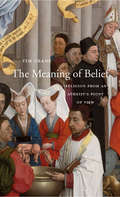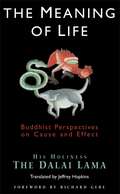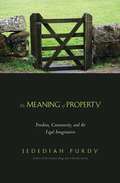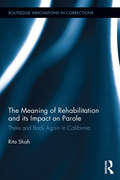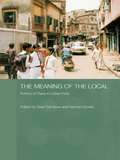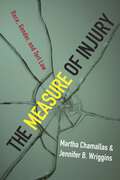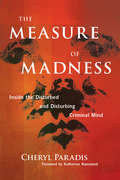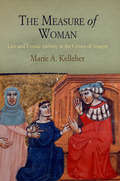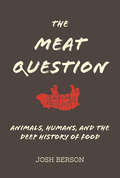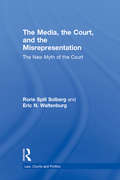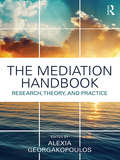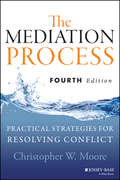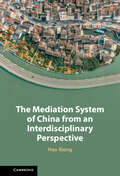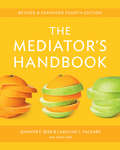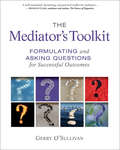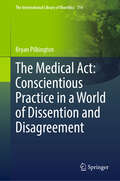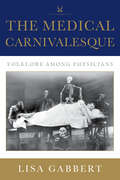- Table View
- List View
The Matrix of Insanity in Modern Criminal Law
by Gabriel HallevyThis book challenges the assumptions of modern criminal law that insanity is a natural, legally and medically defined phenomenon (covering a range of medical disorders). By doing so, it paves the way for a new perspective on insanity and can serve as the basis for a new approach to insanity in modern criminal law. The book covers the following aspects: the structure of the principle of fault in modern criminal law, the development of the insanity defense in criminal law, tangential in personam defenses in criminal law and their implications for insanity and the legal mechanism of reproduction of fault. The focus is on the Anglo-American and European-Continental legal systems. Given the attention consistently drawn by international and domestic events in this context, the book will be of interest to a broad and growing international audience.
The Mauthausen Trial: American Military Justice in Germany
by Tomaz JardimShortly after 9:00 a.m. on May 27, 1947, the first of forty-nine men condemned to death for war crimes at Mauthausen concentration camp mounted the gallows at Landsberg prison near Munich. The mass execution that followed resulted from an American military trial conducted at Dachau in the spring of 1946—a trial that lasted only thirty-six days and yet produced more death sentences than any other in American history. The Mauthausen trial was part of a massive series of proceedings designed to judge and punish Nazi war criminals in the most expedient manner the law would allow. There was no doubt that the crimes had been monstrous. Yet despite meting out punishment to a group of incontestably guilty men, the Mauthausen trial reveals a troubling and seldom-recognized face of American postwar justice—one characterized by rapid proceedings, lax rules of evidence, and questionable interrogations. Although the better-known Nuremberg trials are often regarded as epitomizing American judicial ideals, these trials were in fact the exception to the rule. Instead, as Tomaz Jardim convincingly demonstrates, the rough justice of the Mauthausen trial remains indicative of the most common—and yet least understood—American approach to war crimes prosecution. The Mauthausen Trial forces reflection on the implications of compromising legal standards in order to guarantee that guilty people do not walk free.
The Mayor of Lexington Avenue
by James SheehanJack Tobin is a trial lawyer with a searing-hot reputation in Miami, far removed from his scrappy youth on the streets of New York. But when a young man, Rudy, is railroaded into a murder conviction in the tiny Florida backwater of Bass Creek, Tobin resolves to pay back a debt to his best friend, the boy who once dubbed him 'the Mayor of Lexington Avenue'. Heartbreak, tragedy, courtroom drama and the hope of redemption play out in this utterly page-turning, thought-provoking legal thriller.
The Meadow: Kashmir 1995 - Where The Terror Began
by Cathy Scott-Clark Adrian LevyThe shocking true story of a brutal kidnapping high in the mountains of Kashmir that marked the beginning of modern terrorism. In July 1995, ten backpackers journeyed into the foothills of the Himalayas, trekking to an idyllic campsite known as the Meadow. But their search for tranquillity was savagely interrupted when they were taken hostage by Islamic extremists. Using diaries, letters, classified police reports and interviews with the jihadis themselves, The Meadow traces the escalating tension between kidnappers, victims and police, while examining the high-level conspiracies surrounding the abduction. It tells of the single escape attempt and how – with a brutal beheading – the hostage takers took an irreversible step into the abyss. The shocking true story of the crisis that foreshadowed a new epoch of global terrorism, this is the book that forced Intelligence and government authorities to uncover what really happened in the Meadow.
The Meaning and Purpose of Work: An Interdisciplinary Framework for Considering What Work is For
by Jennifer Tosti-Kharas Christopher Wong MichaelsonTwo seminal crises of the early 21st century – the 9/11 terrorist attacks and COVID-19 pandemic – have led emerging generations of workers to prioritize the meaning and purpose of work. At the same time, other social and environmental crises are threatening, capitalism is evolving, and technology is advancing. In this book, a philosopher and organizational psychologist who together research meaningful work consider what these forces mean for whether work might give meaning and purpose to our lives or take it away. The authors introduce key concepts – meaning, purpose, and work, among others – and consider how they show up in individuals’ experience of work, what role organizations play in cultivating them, and the responsibilities of markets and states to the individuals and organizations working within them. Each chapter includes questions and prompts for review and reflection for students and workers who read the book. The final chapter concludes by introducing an original “6 P” framework for making sense of the functional and moral purpose of work among individuals, organizations, and systems: to pursue and perform, provide and produce, and price and protect work. Readers will emerge with an understanding of the meaning of meaning as well as a practical appreciation for the role of meaning in their own work, the managerial responsibilities they may have for serving the purpose of the organization they work for, and the societal challenges that make the quest for meaningful work a timely imperative
The Meaning of Belief: Religion from an Atheist’s Point of View
by Tim CraneCurrent debate about religion seems to be going nowhere. Atheists persist with their arguments, many plausible and some unanswerable, but they make no impact on believers. Defenders of religion find atheists equally unwilling to cede ground. Noting that religion is not what atheists think it is, Tim Crane offers a way out of this stalemate.
The Meaning of Life
by Jeffrey Hopkins Richard Gere His Holiness the Dalai LamaUsing the traditional Buddhist allegorical image of the Wheel of Life and the teaching of the twelve links of dependent origination, the Dalai Lama deftly illustrates how our existence, though fleeting and often full of woes, brims with the potential for peace and happiness. We can realize that potential by cultivating a wise appreciation of the interdependency of actions and experience, and by living a kind and compassionate life. A life thus lived, the Dalai Lama teaches, becomes thoroughly meaningful for both oneself and for others.
The Meaning of Property: Freedom, Community, and the Legal Imagination
by Jedediah PurdyIn his latest book, Jedediah Purdy takes up a question of deep and lasting importance: why is property ownership a value to society? His answer returns us to the foundations of American society and enables us to interpret the writings of the patron saint of liberal economics, Adam Smith, in a wholly new light. Unlike Milton Friedman and other free-market scholars, who consider property a key to efficient markets, Purdy draws upon Smith's theories to argue that the virtues of wealth are social rather than economic. In Purdy's view, ownership does much more than shield one from government interference. Property shapes social life in ways that bring us closer to, or take us farther from, the ideal of a community of free and equal members. This view of property is neither libertarian nor communitarian but treats the community as the precondition of individual freedom. This view informed U. S. law in the early days of the republic, Purdy writes, and it is one that we need to restore today. Touching upon some of the most charged issues in American politics and law, including slavery, inheritance, international development, and climate change,The Meaning of Propertyoffers a compelling new view of property and freedom and enriches our understanding of democratic society.
The Meaning of Rehabilitation and its Impact on Parole: There and Back Again in California (Innovations in Corrections)
by Rita ShahThis book queries the concept of rehabilitation to determine how, on a legislative and policy level, the term is defined as a goal of correctional systems. The book explores what rehabilitation is by investigating how, at different moments in time, its conceptualization has shaped, and been shaped by, shifting norms, practices, and institutions of corrections in California. The author calls for a rethinking of theoretical understandings of the corrections system, generally, and parole system, specifically, and calls for an expansion in the questions asked in reintegration studies. The book is designed for scholars seeking to better understand the relationship between correctional systems and rehabilitation and the full scope of rehabilitation as a legislative goal, and is also suitable for use as teaching tool for historical, textual, and interviewing methods.
The Meaning of the Holy Qur'an
by Abdullah Yusuf AliThis is a compact and revised edition of Abdullah Yusuf Ali's translation of The Meaning of the Holy Qur'an in modern English. It contains complete translation of the Qur'anic text and retains essential notes of Abdullah Yusuf Ali's exhaustive commentary on the Qur'an, which enables the reader to gain a better understanding of the meaning and message of the Qur'an.
The Meaning of the Local: Politics of Place in Urban India
by Geert De Neve Henrike DonnerBy zooming in on urban localities in India and by unpacking the 'meaning of the local' for those who live in them, the ten papers in this volume redress a recurrent asymmetry in contemporary debates about globalisation. In much literature, the global is associated with transnationalism, dynamism and activity, and the local with static identities and history. Focusing on a range of locales in India's metropolitan areas and provincial small towns, the contributions move beyond the assertion that space is socially constructed to explore the ways in which social and political relations are themselves spatially and historically contingent. Using detailed ethnography, the authors highlight the vitality of place-making in the lives of urban dwellers and the centrality of a 'politics of place' in the production of power, difference and inequality. The volume illustrates how urban spaces are increasingly interconnected through wider social and spatial processes, while local boundaries and group-based identities are at the same time reconstructed, and often even consolidated, through the use of 'traditional' idioms and localised practices. All contributions relate detailed case studies of everyday activities to a range of contemporary debates that highlight various spatial aspects of cultural identities, economic restructuring and political processes in India. The volume provides an interdisciplinary perspective on urban life in rapidly changing political and economic environments. It offers a contribution to policy-orientated debates on urban livelihoods and urban planning as well as a wealth of ethnographic material for those interested in the spatial dimensions of urban life in India.
The Measles Book: Thirty-Five Secrets the Government and the Media Aren't Telling You about Measles and the Measles Vaccine (Children’s Health Defense)
by Children's Health DefenseDiscover thirty-five secrets that the media, US government, and Big Pharma don't want you to know about vaccines. Measles! We all have seen or heard the scary stories about &“outbreaks&” in the media. It has even been declared a &“public health emergency&” at various times. Is it true? Are we and our children at risk? The Measles Book: Thirty-Five Secrets the Government and the Media Aren&’t Telling You about Measles and the Measles Vaccine will help you answer these questions. You will find out if this is just another example of the media, government, and industry misleading us or whether we really have a lot to worry about. The Measles Book presents reliable medical information from the most credible sources available. It is intended to help you make an informed choice about vaccinating your child. The main focus is measles, but many of the issues are relevant to other childhood vaccines. Within the book's pages, the reader will discover thirty-five secrets being kept from the general public about childhood vaccines, especially the measles vaccine. Just a sampling of these secrets include: Vaccines are not safe for every child and the government and pharmaceutical companies have known this for years.Some children will get injured or die from vaccines and the government and pharmaceutical companies know this, too.Pharmaceutical companies have developed an incredible way to make money from vaccines, and not be held accountable.When a child is injured or killed by a vaccine, the pharmaceutical company does not pay for the damage it caused—we do! Learn the other thirty-one secrets when you read The Measles Book by Children's Health Defense, a nonprofit organization committed to the health of our children and challenging misinformation spread by Big Pharma, the government, and the media. The information in The Measles Book is vital for parents to know so they can make informed decisions for their children.
The Measure of Injury: Race, Gender, and Tort Law
by Martha Chamallas Jennifer B. WrigginsTort law is the body of law governing negligence, intentional misconduct, and other wrongful acts for which civil actions can be brought. The conventional wisdom is that the rules, concepts, and structures of tort law are neutral and unbiased, free of considerations of gender and race.In The Measure of Injury, Martha Chamallas and Jennifer Wriggins prove that tort law is anything but gender and race neutral. Drawing on an in-depth analysis of case law ranging from the Jim Crow South to the 9/11 Victim Compensation Fund, the authors demonstrate that women and minorities have been under-compensated in tort law and that traditional biases have resurfaced in updated forms to perpetuate patterns of disparate recovery based on race and gender. Grappling with tort theory, the intricacies of legal doctrine and the practical effects of legal rules, The Measure of Injury is a unique treatise on torts that uncovers the public and cultural dimensions of this always-controversial domain of private law.
The Measure of Madness: Inside the Disturbed and Disturbing Criminal Mind
by Katherine Ramsland Dr. Cheryl ParadisEnter the &“fascinating&” and frightening world of modern forensic psychology as experienced by one of the most respected practitioners in the field today (Robert K. Tanenbaum, New York Times–bestselling author). At the heart of countless crimes lie the mysteries of the human mind. In this eye-opening book, Dr. Cheryl Paradis draws back the curtain on the fascinating world of forensic psychology, and revisits the most notorious and puzzling cases she has handled in her multifaceted career. Her riveting, sometimes shocking stories reveal the crucial and often surprising role forensic psychology plays in the pursuit of justice—in which the accused may truly believe their own bizarre lies, creating a world that pushes them into committing horrific, violent crimes. Join Dr. Paradis in a stark concrete cell with the indicted as she takes on the daunting task of mapping the suspect&’s madness or exposing it as fakery. Take a front-row seat in a tense, packed courtroom, where her testimony can determine an individual&’s fate—or if justice will be truly served. The criminal thought process has never been so intimately revealed—or so darkly compelling—as in this &“excellent and entertaining&” journey into the darkest corners of the human mind (Booklist).
The Measure of Woman: Law and Female Identity in the Crown of Aragon (The Middle Ages Series)
by Marie A. KelleherBy the end of the Middle Ages, the ius commune—the combination of canon and Roman law—had formed the basis for all law in continental Europe, along with its patriarchal system of categorizing women. Throughout medieval Europe, women regularly found themselves in court, suing or being sued, defending themselves against criminal accusations, or prosecuting others for crimes committed against them or their families. Yet choosing to litigate entailed accepting the conceptual vocabulary of the learned law, thereby reinforcing the very legal and social notions that often subordinated them.In The Measure of Woman Marie A. Kelleher explores the complex relationship between women and legal culture in Spain's Crown of Aragon during the late medieval period. Aragonese courts measured women according to three factors: their status in relation to men, their relative sexual respectability, and their conformity to ideas about the female sex as a whole. Yet in spite of this situation, Kelleher argues, women were able to play a crucial role in shaping their own legal identities while working within the parameters of the written law.The Measure of Woman reveals that women were not passive recipients—or even victims—of the legal system. Rather, medieval women actively used the conceptual vocabulary of the law, engaging with patriarchal legal assumptions as part of their litigation strategies. In the process, they played an important role in the formation of a gendered legal culture that would shape the lives of women throughout Western Europe and beyond for centuries to come.
The Meat Question: Animals, Humans, and the Deep History of Food (The\mit Press Ser.)
by Josh BersonA provocative argument that eating meat is not what made humans human and that the future is not necessarily carnivorous.Humans are eating more meat than ever. Despite ubiquitous Sweetgreen franchises and the example set by celebrity vegans, demand for meat is projected to grow at twice the rate of demand for plant-based foods over the next thirty years. Between 1960 and 2010, per capita meat consumption in the developing world more than doubled; in China, meat consumption grew ninefold. It has even been claimed that meat made us human—that our disproportionately large human brains evolved because our early human ancestors ate meat. In The Meat Question, Josh Berson argues that not only did meat not make us human, but the contemporary increase in demand for meat is driven as much by economic insecurity as by affluence. Considering the full sweep of meat's history, Berson concludes provocatively that the future is not necessarily carnivorous.Berson, an anthropologist and historian, argues that we have the relationship between biology and capitalism backward. We may associate meat-eating with wealth, but in fact, meat-eating is a sign of poverty; cheap meat—hunger killing, easy to prepare, eaten on the go—enables a capitalism defined by inequality. To answer the meat question, says Berson, we need to think about meat-eating in a way that goes beyond Paleo diets and PETA protests to address the deeply entwined economic and political lives of humans and animals past, present, and future.
The Media, the Court, and the Misrepresentation: The New Myth of the Court (Law, Courts and Politics)
by Rorie Spill Solberg Eric N. WaltenburgThe Court’s decisions are interpreted and disseminated via the media. During this process, the media paints an image of the Court and its business. Like any artist, the media has license regarding what to cover and the amount of attention devoted to any aspect of the Court and its business. Some cases receive tremendous attention, while others languish on the back pages or are ignored. These selection effects create a skewed picture of the Court and its work, and might affect public attitudes toward the Court. Indeed, studies of media coverage of other governmental institutions reveal that when, and how, their policy decisions are covered has implications for the public’s understanding of, compliance with, support for, and cynicism about the policy. This book uncovers and describes this coverage and compares it to the confirmation hearings, the Court’s actual work, even its members. Rorie Spill Solberg and Eric N. Waltenburg analyze media coverage of nominations and confirmation hearings, the justices’ "extra-curricular" activities and their retirements/deaths, and the Court’s opinions, and compare this coverage to analyses of confirmation transcripts and the Court’s full docket. Solberg and Waltenburg contend that media now cover the Court and its personnel more similarly to its coverage of other political institutions. Journalists still regurgitate a mythology supported by the justices, a "cult of the robe," wherein unbiased and apolitical judges mechanically base their decisions upon the law and the Constitution. Furthermore, they argue the media also focus on the "cult of personality," wherein the media emphasize certain attributes of the justices and their work to match the public’s preferences for subject matter and content. The media’s portrayal, then, may undercut the Court’s legitimacy and its reservoir of good will.
The Mediation Handbook: Research, theory, and practice
by Alexia GeorgakopoulosThe Handbook of Mediation gathers leading experts across fields related to peace, justice, human rights, and conflict resolution to explore ways that mediation can be applied to a range of spectrums, including new age settings, relationships, organizations, institutions, communities, environmental conflicts, and intercultural and international conflicts. The text is informed by cogent theory, state-of-the-art research, and best practices to provide the reader with a well-rounded understanding of mediation practice in contemporary times. Based on four signature themes—contexts; skills and competencies; applications; and recommendations—the handbook provides theoretical, applicable, and practical insight into a variety of key approaches to mediation. Authors consider modern conflict on a local and global scale, emphasizing the importance of identifying effective strategies, foundations, and methods to shape the nature of a mediation mindfully and effectively. With a variety of interdisciplinary perspectives, the text complements the development of the reader’s competencies and understanding of mediation in order to contribute to the advancement of the mediation field. With a conversational tone that will welcome readers, this comprehensive book is essential reading for students and professionals wanting to learn a wide range of potential interventions for conflict.
The Mediation Process
by Christopher W. MooreThe Fourth Edition of a seminal work in the field of mediation and conflict resolutionFor almost thirty years, conflict resolution practitioners, faculty, and students have depended on The Mediation Process as the all-inclusive guide to the discipline. The most comprehensive book written on mediation, this text is perfect for new and experienced conflict managers working in any area of dispute resolution--family, community, employment, business, environmental, public policy multicultural, or international. This is the expert's guide, and the Fourth Edition has been expanded and revised to keep pace with developments in the field. It includes new resources that will promote excellence in mediation and help disputants reach durable agreements and enhance their working relationships.Includes expanded information on the latest approaches for providing mediation assistanceFeatures comprehensive guidelines for selecting the right strategy for both common and unique problemsUtilizes updated, contemporary case studies of all types of disputesOffers expanded coverage of the growing field and practice of intercultural and international mediation
The Mediation System of China from an Interdisciplinary Perspective
by Hao XiongDelivering a much-needed in-depth, interdisciplinary exploration of mediation practices in China, this study removes the common misconception that mediation is merely a mechanical application of norms. It provides a comprehensive understanding of China's mediation practices by blending cultural, social, and legal analyses with detailed case descriptions from fieldwork. Readers will gain insights into the interactive dynamics between legal norms and the social environment in grassroots China. This book helps readers understand mediation and Chinese law within their broader cultural, social, and political contexts, offering insights beyond the purely legal dimension. The book is an invaluable resource for scholars, students, and practitioners in the fields of Chinese law, dispute resolution, and socio-legal studies. It offers a unique perspective that contextualizes mediation within the socio-political landscape, providing readers with a richer, more nuanced understanding of Chinese legal culture.
The Mediator's Handbook
by Caroline C. Packard Eileen Stief Jennifer E. BeerThe popular The Mediator's Handbook presents a time-tested, adaptable model for helping people work through conflict. Extensively revised to incorporate recent practice and thinking, the accessible manual format lays out a clear structure for new and occasional mediators while offering a detailed, nuanced resource for professionals. Starting with a new chapter on assessing conflict and bringing people to the table, the first section explains the process step by step, from opening conversations and exploring the situation through the phases of finding resolution--deciding on topics, reviewing options, and testing agreements. The "Toolbox" section details the concepts and skills a mediator needs in order to: Understand the conflict Support the people Facilitate the process Guide decision-making Throughout the book, the emphasis is on what the mediator can do or say now, and on the underlying principles and core methods that can help the mediator make wise choices. Long a popular course textbook for high schools, universities, and training programs, The Mediator's Handbook is also a valued desk reference for professional mediators and a practical guide for managers, organizers, teachers, and anyone working with clients, customers, volunteers, committees, or teams. Jennifer E. Beer, PhD, mediates organizational conflicts, facilitates meetings, and offers related workshops, regularly teaching a negotiation course at Wharton (University of Pennsylvania). Caroline C. Packard, JD led Friends Conflict Resolution Programs for fifteen years and is an organizational conflict response specialist and mediator based in Philadelphia, Pennsylvania. Eileen Stief developed the mediation process presented in the Handbook, training a generation of mediators to work with community, multi-party, and environmental disputes.
The Mediator's Toolkit: Formulating and Asking Questions for Successful Outcomes
by Gerry O'Sullivan“Dives deep into the psychology of information and emotion in conflict situations . . . Highly recommended for facilitators and negotiators as well as mediators.” —Jennifer Beer, author of The Mediator’s Handbook and negotiation instructor at Wharton School, University of PennsylvaniaKnowing how to formulate and ask incisive questions to get to the core of a conflict, challenge entrenched thinking, and shift perspectives is the key to successful conflict resolution. The Mediator’s Toolkit employs the author’s powerful “S Questions Model” to provide readers with the skills and tools to do just that. It addresses four dimensions of successful questions for mediation: the subject matter dimension, the structure dimension, the information-seeking dimension, and the shifting thinking dimension. The toolkit clearly explains:The theory behind each question type, including exploration of relevant neuroscience and psychologyThe purpose of different types of questionsHow the questions workWhen to use different types of questionsHow to build and apply questions to mediation in a non-threatening wayThis essential practical guide will radically sharpen, focus, and improve the questioning skills of qualified mediators, students, lecturers, trainers, and those using questions to challenge and effect change, in any context.
The Medical Act: Conscientious Practice in a World of Dissention and Disagreement (The International Library of Bioethics #114)
by Bryan PilkingtonThis book takes a step back from the usual debates over conscience in medicine and asks whether the conscientious practice of individual healthcare practitioners is coherent and acceptable on its own. This book argues in the affirmative and describes how we move forward in light of the deep moral and professional disagreement that exists. The book explains why the current framing within the debate is mistaken and offers an alternative framing. In so doing, the author discusses disagreement within healthcare professions, the distinction between conscience protectors and conscience dissenters, and how to properly understand the role of religious and personal philosophical reasons in practicing conscientiously. The book articulates the key confusion in much of the current debate – that disagreement over conscience in medicine is due to religious or personal philosophical beliefs – and rejects it. The book then, positively, argues that differing accounts of moral responsibility are at the root of this disagreement, opening up new avenues for dialogue and potentially fruitful collaborations. The book concludes with a much needed and basic discussion of what is going on when practical judgements are made in healthcare: the medical act. This book is of great interest to both advanced undergraduate and graduate students in philosophy, bioethics, and medicine, as well as researchers, physicians, and health professionals.
The Medical Carnivalesque: Folklore among Physicians
by Lisa GabbertThe practice of medicine is immersed in issues of life, death, and suffering in relation to the mortal body. Because of this, the medical profession is a fertile arena for folklore that serves to address these topics among physicians.In The Medical Carnivalesque, Lisa Gabbert argues that this extraordinarily difficult work context has led to the development of an occupational corpus of folklore, backstage talk, and humor that she calls the medical carnivalesque. Gabbert argues that suffering is not only something experienced by patients, but that the organization, practice, and ethos of medicine can induce suffering in physicians themselves. Featuring topics such as the institutionalized nature of physician suffering, death-related humor and talk, stories about patient bodies, and parodies of medical specialties, The Medical Carnivalesque shows us how the culture of contemporary medicine uses travesty, humor, and inversion to address the sometimes painful and often transgressive aspects of doctoring. The Medical Carnivalesque connects patient and physician suffering to laughter; acknowledges suffering as an essential component of life; and constitutes a way in which some physicians address the core philosophical and existential issues with which they regularly engage as they go about their daily work.
The Medical-Pharmaceutical Killing Machine: Facing Facts Could Save Your Life
by Children's Health DefenseMedical and pharmaceutical history is replete with examples of dangerous interventions that have poisoned, injured, or killed. However, events since 2020 have attracted attention as never before to medicine&’s potential to be both lethal and malevolent. In The Medical-Pharmaceutical Killing Machine, Children&’s Health Defense situates current perils in their broader context with the aim of helping readers understand how to protect themselves and their loved ones. In the Greek Trojan War saga, the god Apollo ensured that Cassandra&’s prophecies would never be believed, with disastrous consequences. As recounted in the book, modern medicine, too, has produced its fair share of &“medical Cassandras&”—doctors and writers who have tried to warn the public about medicine&’s life-threatening underbelly, generally to little avail. A chapter dedicated to nine of these medical skeptics, beginning with Ivan Illich and his coining of the term &“iatrogenesis&” to describe adverse outcomes caused by doctors, weaves a powerful portrait of harms regularly denied and ignored, with those making the claims typically marginalized and &“canceled.&” The book shows that there is no shortage of tools in the killing machine arsenal. One chapter highlights the mRNA vaccine technology inaugurated with COVID, illustrating how this new mechanism for iatrogenesis is inflicting novel forms of toxicity, not all of which are yet understood. Another chapter about assisted suicide and euthanasia describes the chilling global proliferation of policies and propaganda promoting those practices for vulnerable populations that include babies, children, people diagnosed with autism, and the mentally ill. The book also describes factors that make it possible for the killing machine to continue operating with impunity, including the ascendance of an &“evidence-based medicine&” juggernaut, medical gaslighting, and a ballooning global enforcement infrastructure. Nor does it shy away from confronting what some now characterize as &“iatrogenocide&”; a chapter asking &“Why Do They Do It?&” considers money, prestige, and control as three possible answers. Ultimately, it is only by acknowledging the long-standing reality of an all-too-effective medical-pharmaceutical killing machine that people can learn to dodge the threats and work toward building a different model that prioritizes life and genuine health.
